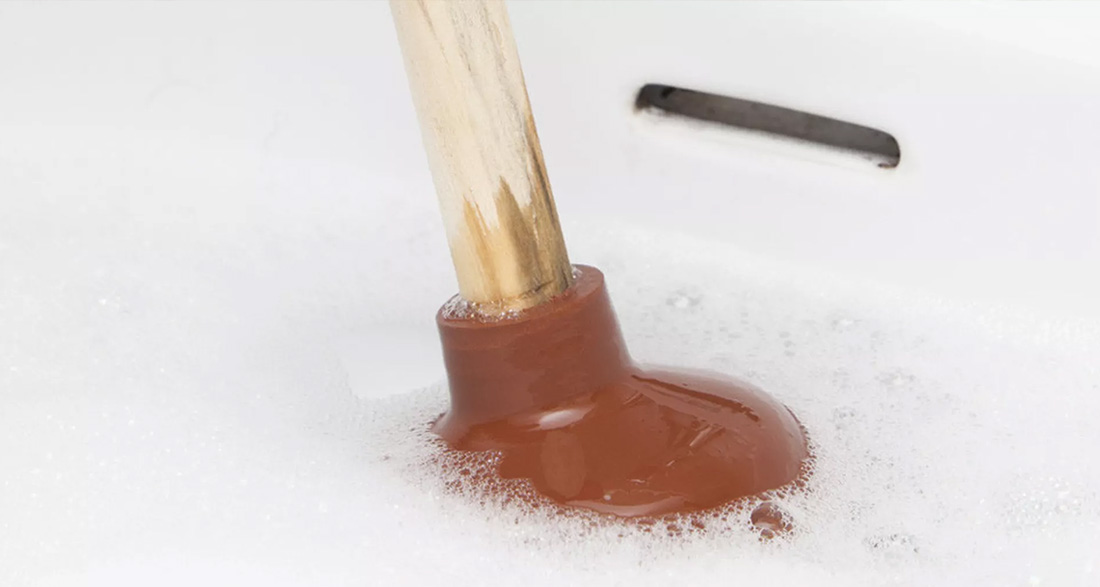Is the water not draining and the sink gurgling? Clearly, the pipe is clogged. You don’t always need harsh chemicals or an expensive plumber to clear a drain. Often, simple household remedies can unclog the pipe.
It’s not uncommon for drains to get clogged. Instead of using caustic drain cleaners or calling an expensive emergency plumber, in most cases, the use of simple household remedies, which are usually always available, can already free the pipe. This saves money and is better for the environment – and of course, your drain will thank you too.
Household Classic: The Plunger
Most of the time, it’s the first choice when the drain is clogged. The mechanism is simple: the rubber cup creates a vacuum in the pipe and pulls loose material up and out of the drain. A plunger works well for clogs caused by foreign objects, such as a forgotten kitchen towel in the sink, food scraps, or – yuck – toilet paper.
It’s not always pleasant what the plunger brings up, but it’s worth using this tool first for clogged pipes. Using a plunger is straightforward: fill the clogged sink halfway with warm water to reduce odor and serve as a rinse for the pipe. Place the plunger over the drain and pump vigorously until the gunk is sucked out of the pipe. You can increase the suction power by applying petroleum jelly or grease to the edge of the suction cup for a better seal, which creates more vacuum.
Clear the Pipe with Vinegar and Baking Soda for Hair and Grease
Often, the shower drain gets clogged because too many hairs have ended up in the drainpipe. Grease can also build up in kitchen drains, gradually blocking the water flow. A plunger only helps to a limited extent here. You can clean the drain differently and just as easily! Instead, pour some hot water into the drain (this increases the temperature and promotes the chemical reaction), then add 4 tablespoons of baking soda or baking powder into the drain and pour in a good amount of vinegar or vinegar essence. The substances will react in the pipe and dissolve the clog. To help, you can try loosening some of the hair clump in the pipe with a long wire before using vinegar and baking soda.
Not a Job for the Plumber: Lime and Urine Scale
Residents of cities with very hard water will know this problem: lime gradually builds up on the pipe walls and in bends, eventually clogging the pipe. The drain allows less and less water through. Usually, this would be a job for the plumber, right? Not necessarily: lime, urine scale, and soap residue react sensitively to acid. Of course, we only want to dissolve the clog, not the entire pipe. So, stay away from strong acids. Cola, vinegar, or citric acid are good for clearing lime from a pipe: just pour in plenty and let it sit for several hours, ideally overnight.
Caution with Miracle Products
Occasionally, hardware stores sell compressed air guns that claim to blow the clog out of the pipe. Be cautious! These small pumps build up several bars of pressure. Especially in new buildings, the drain pipes are often made of plastic and are not designed to withstand such pressure. Your drain pipe could burst. This would not only create a huge mess but also become very expensive quickly. Better to avoid than to repair!
The most effective method against drain clogs is, of course, to prevent them in the first place: simply avoid throwing solid materials down the drain – this way, it won’t clog. A strainer for the sink, bathtub, and shower is available in almost any household goods section for little money and performs important preventive work. This way, you avoid most of the things that can lead to clogs. Clean the strainers regularly so they can continue to catch new materials. Do not dispose of intimate textiles in the toilet; instead, place a trash can next to it.
Before washing greasy pans, pots, and plates, wipe them with a paper towel, which you then throw in the trash. Alternatively, newspaper or flyer paper works well. By the way, the environment benefits too: you’ll need much less dish soap, and your wastewater will be easier to treat.

